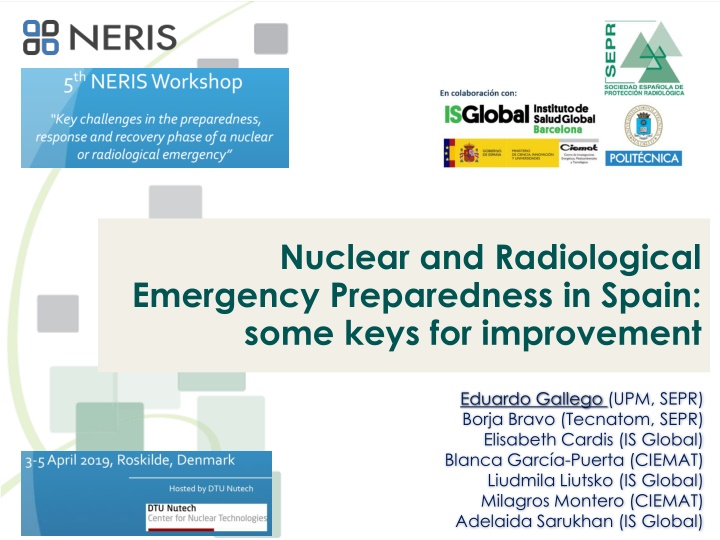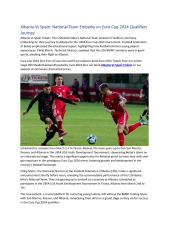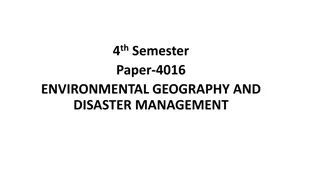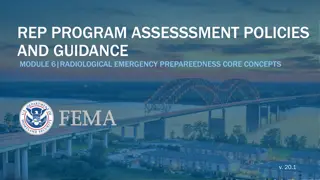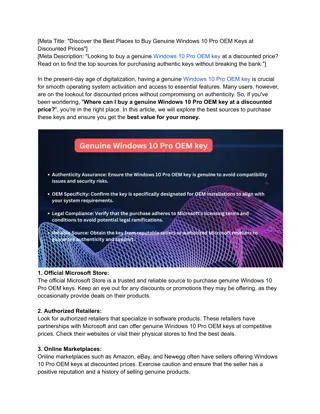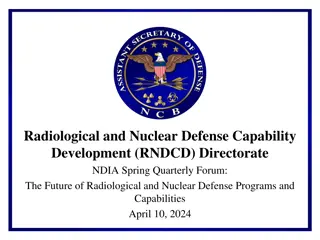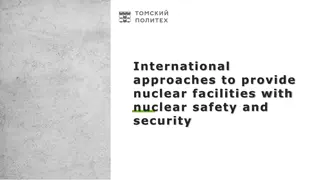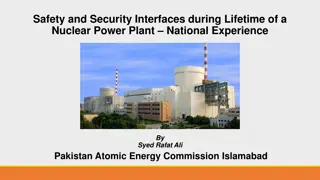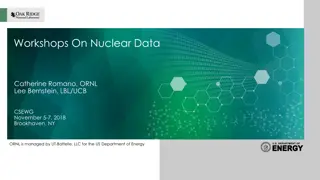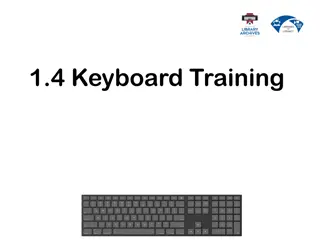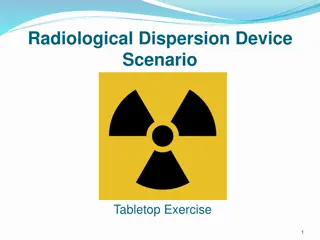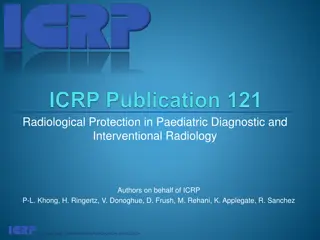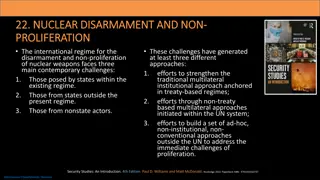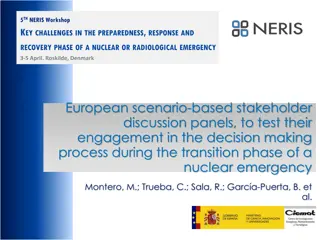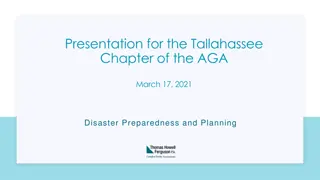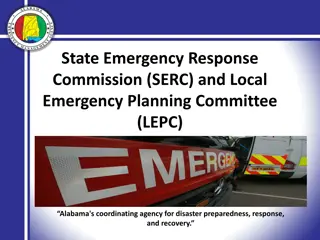Nuclear and Radiological Emergency Preparedness in Spain: Keys for Improvement
This article discusses ways to enhance nuclear and radiological emergency preparedness in Spain, highlighting recommendations from experts in the field. The authors address challenges and propose strategies for improving response capabilities in the event of emergencies. Key considerations include risk assessment, communication protocols, training programs, and coordination among relevant stakeholders, aiming to strengthen overall preparedness and response efforts.
Download Presentation

Please find below an Image/Link to download the presentation.
The content on the website is provided AS IS for your information and personal use only. It may not be sold, licensed, or shared on other websites without obtaining consent from the author.If you encounter any issues during the download, it is possible that the publisher has removed the file from their server.
You are allowed to download the files provided on this website for personal or commercial use, subject to the condition that they are used lawfully. All files are the property of their respective owners.
The content on the website is provided AS IS for your information and personal use only. It may not be sold, licensed, or shared on other websites without obtaining consent from the author.
E N D
Presentation Transcript
Nuclear and Radiological Emergency Preparedness in Spain: some keys for improvement Eduardo Gallego (UPM, SEPR) Borja Bravo (Tecnatom, SEPR) Elisabeth Cardis (IS Global) Blanca Garc a-Puerta (CIEMAT) Liudmila Liutsko (IS Global) Milagros Montero (CIEMAT) Adelaida Sarukhan (IS Global)
Introduction Adequate preparedness for emergency response and recovery requires continuous improvement efforts. The experience of nuclear and radiological accidents in the past, the ICRP recommendations and also the advances from recent research projects raise many points for improvement of radiological preparedness and the post-accident recovery (EP&R). and nuclear emergency A one-day workshop was organized To present the main conclusions of PREPARE and SHAMISEN projects, as well as past experiences hold in Spain with multi-institutional participation in this field (ECORINTE-07, NERIS-PENTA-12 or CURIEX-13). To encourage debate and dialogue among relevant actors on how these experiences could be adapted and applied to the Spanish context: what would be the role of each institution at the national and local level, and how coordination between them could be improved. 5th NERIS Workshop 2 3-5 April 2019, DTU Nutech, Roskilde, Denmark
One-day Workshop organized by the Spanish Society of Radiological Protection (SEPR), with the collaboration of CIEMAT, UPM and ISGlobal The main results and recommendations of recent research projects (PREPARE, SHAMISEN) were presented, as well as past exercises with significant stakeholder participation (within EURANOS and NERIS-TP projects) and ongoing projects (CONFIDENCE; SHAMISEN SINGS and ENGAGE) 5th NERIS Workshop To get a realistic picture of stakeholder participation in EP&R in Spain ENGAGE 3 3-5 April 2019, DTU Nutech, Roskilde, Denmark
SEPR Workshop September 2108 Spanish Radiological Protection Society (SEPR) CIEMAT Institute of Global Health of Barcelona (ISGlobal) University experts (UP Basque Country, Valencia, Madrid) Research Institute on Health Carlos III (ISCiii) Hospital experts (Gregorio Mara n-Madrid; La F - Valencia) Spanish Red Cross (international relations) General Directorate for Civil Protection and Emergencies (DGPCE) Director of Civil Protection and Emergencies of Extremadura Safety and Emergencies Agency of Valencia Nuclear Energy subdirection. Ministry of Ecological Transition. Nuclear Safety Council (CSN) Ministry of Agriculture, Fisheries and Food (MAPA) Spanish Food Safety Authority (AECOSAN) Association of Municipalities in Nuclear Areas (AMAC) Military Unit for Emergencies (UME) Madrid Firefighters (NBC unit) National Company of Radioactive Waste Management (ENRESA) Nuclear power plants (Asc -Vandell s; Almaraz-Trillo) Nuclear Industry Forum (FORO Nuclear) Greenpeace Spain TECNATOM (technical support during emergencies) PROINSA (technical support during emergencies) GDES (technical support during emergencies) Great success: about 40 participants representing a wide spectrum of organizations and stakeholders involved in Emergency Preparedness and Response (EP&R) 5th NERIS Workshop 4 3-5 April 2019, DTU Nutech, Roskilde, Denmark
SEPR Workshop September 2108 Great success: about 40 participants representing a wide spectrum of organizations and stakeholders involved in Emergency Preparedness and Response (EP&R) 5th NERIS Workshop 5 3-5 April 2019, DTU Nutech, Roskilde, Denmark
Topics for discussion Three groups were organized for discussion. Main targets: 1. Identify strengths and limitations with regard to EP&R in Spain (including health and socio-psychological follow-up), both from a theoretical and practical point of view. 2. What can be improved and how? 5th NERIS Workshop 6 3-5 April 2019, DTU Nutech, Roskilde, Denmark
Topics for discussion Beyond the purely technical aspects, it is necessary to distinguish at least three fundamental areas in which to work for the improvement of the EP & R: The social and economic environment The radiological and environmental field The health field Multiple issues can be identified that, in order to be successfully addressed, require an active participation of the relevant stakeholders and collaboration between the different domains. 5th NERIS Workshop 7 3-5 April 2019, DTU Nutech, Roskilde, Denmark
Topics for discussion Some subjects suggested for the debate: a) Communication and coordination between relevant actors: definition of common objectives and establishment of agile protocols, not only for the emergency but also for the preparation of the post-accidental phases and its practice through frequent periodic exercises. b) The participation of the public in the EP & R and how to organize it to comply effectively with the prescriptions of, among others, the Euratom Directive 2013/59. c) Role that can play for maintaining public confidence by the different actors and institutions (Civil Protection, security forces and bodies, the Military Emergency Unit, health care personnel, social workers, psychologists, environmental organizations, (universities) and the media, social networks, etc.) independent experts d) The individual radiological and health control of the population, with special emphasis in children, and the implementation of a protocol that allows sharing this information with health and other relevant actors for monitoring populations, respecting the ethical criteria. 5th NERIS Workshop 8 3-5 April 2019, DTU Nutech, Roskilde, Denmark
Topics for discussion Some subjects suggested for the debate: a) The exhaustive radiological control of the affected areas b) The exhaustive radiological control of food and water. c) The communication of the results of the controls in a clear and easily understandable way by the population in general. d) The preparation of the transition phase from a situation of emergency exposure to the existing exposure situation. e) Decontamination based on an optimized program, and the proper management of radioactive waste generated. f) The establishment and agile management of economic compensation to those affected. g) Advice to the evacuated populations regarding labor, educational issues, etc. h) The definition of the habitability level of the areas affected by radioactivity and the return of the evacuated or transferred population with all suitable supports. 5th NERIS Workshop 9 3-5 April 2019, DTU Nutech, Roskilde, Denmark
Topics identified Radiological non-nuclear emergencies are in general more difficult to prepare because of the difficulty to identify potentially affected areas and the heterogeneity of situations. The need to fill existing gaps and the preparation of the main actors involved was highlighted. An obstacle is the fragmentation of legal competences between central, regional and local administration levels. During the emergency phase, a single chain of command is necessary to avoid lack of coordination. But, for the development and management of intermediate and recovery phases, decentralization and local administration levels are important. In any case, it is convenient to establish networks and coordinate the flow of information between the groups involved. 5th NERIS Workshop 10 3-5 April 2019, DTU Nutech, Roskilde, Denmark
Topics identified (2) There are doubts about capacity of laboratories to afford massive analysis of samples with relatively high activities, giving answers in a reasonable time. The technical competence of laboratories are not questioned. The communication role of the nuclear installation during the accident not always duly taken into account Beyond dose criteria, implementation of countermeasures must consider all kind of consequences (for instance, impact on health of elderly of sick patients; psycho-social problems; etc.) It is necessary to increase awareness of local societies to reduce the difficulties when implementing countermeasures The participants highlighted the difficulties of stakeholders to focus on thinking about the post-accident recovery phase. 5th NERIS Workshop 11 3-5 April 2019, DTU Nutech, Roskilde, Denmark
Topics identified (3) The organization of the emergency must generate confidence, while in many cases there is a lack of trust in the institutions among the population. In order to face this problem, some ideas were pointed out, among others: Promote interaction with the interested parties to consider and prioritize those issues they are most concerned with, not always linked to radioactivity or dose. It is also necessary to seek the support of the health and medical staff of the municipalities, as well as the teaching staff of the educational centers of the impacted areas. To promote responsibility in the media and social networks, through specific campaigns. To take advantage of the easy access to information by the population, and even to make their own measurements at very low cost to integrate it into the general flow of information, which can reinforce official messages. It would be desirable to train and empower local figures in the potentially affected areas, so they can be referents when disseminating information. Local communication groups (with voluntaries) could be very beneficial 5th NERIS Workshop 12 3-5 April 2019, DTU Nutech, Roskilde, Denmark
Topics identified (4) Need of more frequent exercises (table-top exercises), which do not need to be very complex, but help to speed up countermeasures implementation and focus on specific aspects of interest. Also important how to present to the affected population and the general public the magnitude or severity of consumer products contamination Better to give messages of qualitative nature (i.e. suitable or not to be consumed) than to focus on specific radioactivity values compared against limits or reference values, which are not well understood by the population. In relation to contamination limits, these should be flexible enough to adapt to the local circumstances of each zone at each moment. Appropriate consumption recommendations can be given according to the circumstances of the affected area. 5th NERIS Workshop 13 3-5 April 2019, DTU Nutech, Roskilde, Denmark
Recommendations Efforts must be made to increase the radiation protection culture of the different stakeholders and the population in general, for example, through periodic exercises and analysis of realistic accident scenarios. Experts and stakeholders must interact and cooperate through open networks. Apart from certain technical aspects, the key points for improvement in EP&R mainly depend on the participation, motivation and commitment of the interested organizations and the population. This is the great challenge. 5th NERIS Workshop 14 3-5 April 2019, DTU Nutech, Roskilde, Denmark
and conclusion The proposals and conclusions from the Workshop can be very useful to be considered in the improvement of the nuclear and radiological emergency plans, enriched by the participation and perspectives of the different actors. The SEPR intends to continue with this type of activities through a new working group. 5th NERIS Workshop 15 3-5 April 2019, DTU Nutech, Roskilde, Denmark
